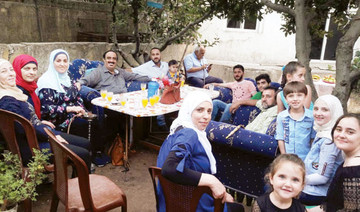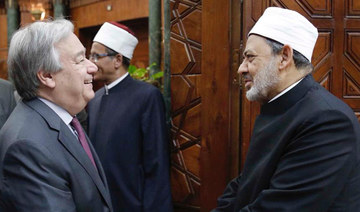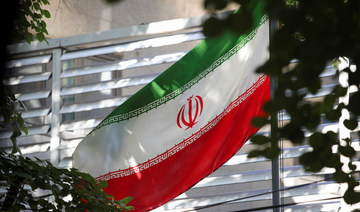BEIRUT: As Lebanon marks 44 years since the start of its civil war on Saturday, families whose loved ones disappeared during the conflict hope they might finally get some answers.
The small multi-confessional country passed a landmark law in November to determine the fate of thousands of Lebanese who went missing in the 1975-1990 war.
But political parties once involved in the fighting must now encourage followers with key data such as the location of mass graves to come forward to help.
Wadad Halwani, who heads the Committee of the Families of the Kidnapped and Missing, says the new legislation has given grieving relatives a glimmer of hope.
“It’s the first time we commemorate the war with a law to enshrine the right to know... the fate of all the missing, dead or alive,” she said.
More than 150,000 people were killed during Lebanon’s civil war and some 17,000 people went missing, according to official figures.
Halwani’s husband was among them, abducted, never to return.
For more than a decade, she and a dozen other women have regularly protested in the garden outside the UN headquarters in Beirut, clutching faded photographs of their long-gone loved ones.
The new law is “crucial to allow relatives of the missing to move on with their lives like everyone else, instead of wasting them waiting,” she said.
Law 105 gives families the right to know the place of abduction or detention of their loved one, as well as the whereabouts of their remains and the right to retrieve them.
To do this, the Cabinet must set up an official commission of inquiry to gather testimonies and investigate mass graves. But five months on, nothing has been done.
Former lawmaker Ghassan Moukheiber, who co-drafted the law, said political will was key to moving forward.
The “decision to pass this law now needs to be translated into appointing a commission and facilitating its work,” he said.
The probing body is to include, among others, family representatives, lawyers, an academic and a forensic doctor.
Once formed, its first task should be to draw up a unified list of all those missing, Moukheiber said.
They will have to “track down... those still alive and work toward their return, as well as retrieving the remains of those killed or dead,” he said.
The International Committee of the Red Cross has said it is willing to hand over all information and DNA samples it has collected into a database on the missing since 2012.
But what Moukheiber describes as the commission’s “purely humanitarian” mission is also a highly sensitive one.
After Lebanon’s war ended, Parliament in 1991 passed a general amnesty law that saw former warlords breathe a sigh of relief and move on to politics.
Almost three decades later, their parties are still going strong, and persisting differences have repeatedly sparked government deadlocks.
“A number of parties that were once militias and have... a past of war crimes have started to at least tentatively fear this commission’s future work,” Moukheiber said.
With numerous groups implicated, choosing where to start will also be delicate.
“In what mass grave should the inquiry begin?” asked the former lawmaker.
“There are burial grounds all over Lebanon, in every area once under control of” an armed group, he said.
“Choosing where and how to exhume these graves will require wisdom and courage.”
All previous calls to investigate the fate of Lebanon’s missing have come up against uncooperative political parties and inactive governments.
Researcher Lokman Slim, who has spent years gathering data on the missing, says there was little chance the commission would produce tangible results.
“That a political authority with blood-drenched hands actually voted on this law just means that it doesn’t fear its consequences,” said the head of the Umam Documentation and Research center.
“It knows very well that, as with so many issues in Lebanon, the law will simply remain ink on paper.”
“In Parliament, in government, in the circles of Lebanese leaders, there are dozens... who have the detailed information we need about the fate of the missing or locations of mass graves,” Slim said.
But he says he doubts the law’s ability to spark collective introspection into “what led them into a bloody war” in the first place.
Relatives of the missing, however, are determined.
“Successive governments have accused us of pouring salt into old wounds,” said Halwani. But “the whole of society needs to know the truth because it’s the only way forward toward real reconciliation,” she added.
Decades on, families of Lebanon’s war missing see hope
Decades on, families of Lebanon’s war missing see hope

- For more than a decade, she and a dozen other women have regularly protested in the garden outside the UN headquarters in Beirut, clutching faded photographs of their long-gone loved ones
British Royal Navy shoots down missile for first time since Gulf War in 1991 amid Houthi attacks on shipping

- Iran-backed group said its missiles targeted US ship Maersk Yorktown, an American destroyer in the Gulf of Aden and Israeli ship MSC Veracruz
LONDON: A British Royal Navy destroyer shot down a ballistic missile on Wednesday for the first time since the first Gulf War in 1991, the UK’s defense secretary told The Times newspaper.
In a report published Thursday, Grant Shapps told the newspaper that HMS Diamond used its “Sea Viper” missile system to target the weapon, which Yemen’s Houthi militia said they used to target two American ships in the Gulf of Aden and an Israeli vessel in the Indian Ocean.
The Iran-backed group said its missiles targeted US ship Maersk Yorktown, an American destroyer in the Gulf of Aden and Israeli ship MSC Veracruz in the Indian Ocean, its military spokesman Yahya Sarea confirmed.
It is the first such attack from the Yemeni militia in two weeks in the region, where Royal Navy Type 45 destroyers have been deployed to protect commercial ships since the Houthis initiated strikes on global shipping in November last year in solidarity with Palestinians in Gaza.
“The Yemeni armed forces confirm they will continue to prevent Israeli navigation or any navigation heading to the ports of occupied Palestine in the Red and Arabian Seas, as well as in the Indian Ocean,” Sarea said on Wednesday.
Shapps said the latest Houthi attack was an example of how dangerous the world was becoming and how “non-state actors were now being supplied with very sophisticated weapons” from states such as Iran.
His comments came after UK Prime Minister Rishi Sunak this week pledged to increase spending on British defense to 2.5 percent of national income, something Shapps said was “so vital” given continued tensions in the Middle East.
Al-Azhar Al-Sharif condemns terrorist crimes against civilians in Gaza
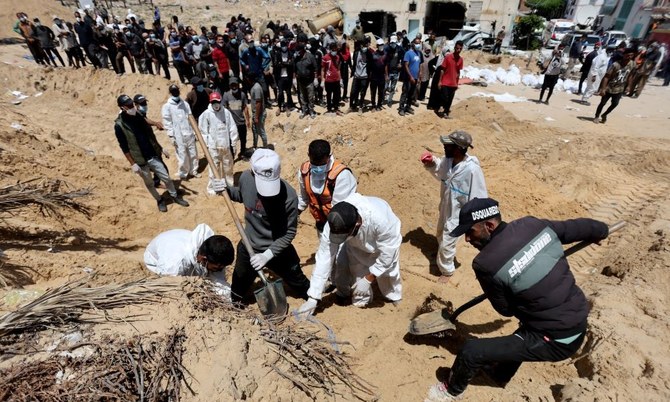
- Al-Azhar Al-Sharif reiterated the need for the international community to assume its responsibilities and put a stop to the ‘frenzied aggression against the people of Gaza’
- Al-Azhar said that the bodies of hundreds of Palestinians, including patients, had been uncovered in mass graves at the Nasser Medical Complex in Khan Younis
CAIRO: Al-Azhar Al-Sharif — Sunni Islam’s oldest and foremost seat of learning — has strongly condemned “the terrorist crimes being committed against civilians in the Gaza Strip.”
In a statement, Al-Azhar censured the attacks, “the hideousness of which was revealed through the widespread reports about mass graves of hundreds of bodies of children, women, the elderly, and medical personnel in the vicinity of the Nasser and Al-Shifa Medical Complexes.
“Also, dozens of bodies were found “scattered” in shelter and displacement centers and tents, and residential neighborhoods throughout the Strip.”
Al-Azhar said that it affirmed to the world that “these mass graves are the definitive proof that these hideous atrocities and horrors have become normal daily behavior for Israel.”
It said that the people of the world must unite to protest in a way that deterred the regimes supporting these crimes.
Al-Azhar demanded an urgent international trial against “the terrorist occupation government, which no longer knows the meaning of humanity or the right to life and is committing genocides every day.”
It reiterated the need for the international community to assume its responsibilities, stop the “frenzied aggression against the people of Gaza and the consequent suffering and unprecedented humanitarian disasters, and ensure the protection of civilians and the delivery of sufficient and sustainable humanitarian aid to all parts of the Gaza Strip.”
Al-Azhar expressed its “sincere condolences and sympathy to the Palestinian people and the families of the martyrs, calling on the Lord Almighty to shower them with His vast mercy and forgiveness, to reassure the hearts of their families and loved ones, and to speed up the recovery of the sick.”
Citing media reports, Al-Azhar said that the bodies of hundreds of Palestinians, including patients, had been uncovered in mass graves at the Nasser Medical Complex in Khan Younis since Saturday.
New UK sanctions target Iranian drone industry
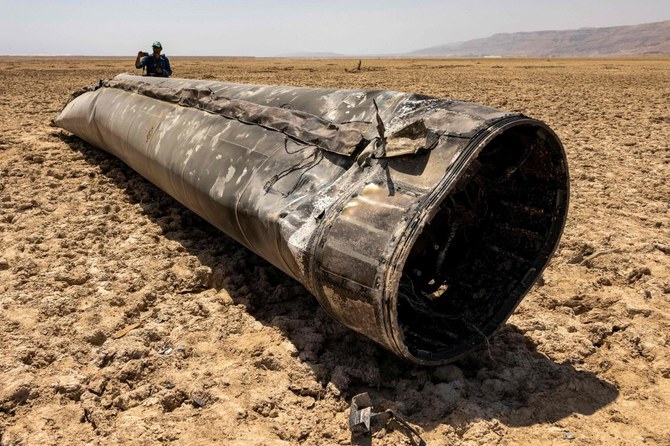
- The measures, taken in co-ordination with the US and Canada, target four businesses and two directors at a network of drone companies
LONDON: Britain on Thursday announced new sanctions targeting Iran’s military drone industry, in response to Iran’s drone and missile attack on Israel earlier this month.
The measures, taken in co-ordination with the US and Canada, target four businesses and two directors at a network of drone companies with the aim of limiting Iran’s ability to launch drones.
“The Iranian regime’s dangerous attack on Israel risked thousands of civilian casualties and wider escalation in the region,” British Foreign Secretary David Cameron said in a statement.
“Today the UK and our partners have sent a clear message – we will hold those responsible for Iran’s destabilising behavior to account.”
Britain also said it would introduce new bans on the export of drone and missile components to Iran, seeking to limit its military capabilities.
Last week, Britain imposed sanctions on Iranian military figures and organizations, in another coordinated move with the United States, following Iran’s action against Israel.
Iran launched drones and fired missiles at Israel on April 13 as a retaliatory strike for the attack on its embassy compound in Damascus two weeks prior, raising the risk of further escalation in conflict in the Middle East.
Egypt, Dutch leaders discuss Gaza ceasefire efforts

- Rafah assault ‘will have catastrophic consequences on regional peace and security,’ El-Sisi warns
- Egypt’s president and the Dutch prime minister agreed on the urgency of working toward reaching a ceasefire
CAIRO: Egypt’s President Abdel Fattah El-Sisi has discussed efforts to reach a ceasefire in Gaza with Mark Rutte, prime minister of the Netherlands.
During a phone call from Rutte on Thursday, the Egyptian leader warned that any Israeli assault on Rafah will have “catastrophic consequences” for the humanitarian situation in the enclave.
The leaders discussed bilateral relations, and ways to enhance cooperation across various political and economic levels consistent with the current momentum in Egyptian-European relations.
Ahmed Fahmy, presidential spokesman, said the call also focused on the situation in Gaza, and Egypt’s efforts to restore regional stability by reaching a ceasefire and providing access to humanitarian aid.
El-Sisi reiterated the crucial importance of ending the war, warning against any military operations in the Palestinian city of Rafah, which will have catastrophic consequences on the humanitarian situation in the strip and on regional peace and security.
The Egyptian leader underscored the need for the international community to assume its responsibilities to implement the relevant UN resolutions.
Egypt’s president and the Dutch prime minister agreed on the urgency of working toward reaching a ceasefire, and ensuring the flow of adequate humanitarian aid to all areas of the Gaza Strip in order to protect it from a humanitarian catastrophe.
They also emphasized the need to move toward implementing the two-state solution, which would restore regional stability, and establish security and peace in the region.
In March, El-Sisi received Rutte to discuss bilateral relations, regional developments, and Egypt’s efforts to reach a ceasefire and offer humanitarian assistance in Gaza.
Lebanon postpones local elections again as violence rocks south

- Lebanon is supposed to hold municipal elections every six years
- Parliament approved “extending the existing municipal and elective councils’ mandate until a date no later than May 31, 2025,” despite objections from lawmakers opposed to Hezbollah
BEIRUT: Lebanon’s parliament on Thursday delayed municipal elections for a third time in two years, state media reported, as militants in the country’s south exchanged near-daily fire with Israel for over six months.
The powerful Iran-backed Hezbollah group has been trading fire with Israeli forces across the border since the day after its Palestinian ally Hamas carried out a deadly attack on Israel on October 7, triggering the ongoing war in the Gaza Strip.
Lebanon is supposed to hold municipal elections every six years, but cash-strapped authorities last held a local ballot in 2016.
Parliament approved “extending the existing municipal and elective councils’ mandate until a date no later than May 31, 2025,” despite objections from lawmakers opposed to Hezbollah, said the official National News Agency.
The bill cited “complex security, military and political circumstances following the Israeli aggression on Lebanon” and especially its south, near the border, as reasons for the delay.
Lawmakers did not set a new date for the elections, initially scheduled for 2022.
Local councils help provide basic services to residents, but their role has declined as state coffers ran dry after Lebanon’s economy collapsed in late 2019.
Parliament Speaker Nabih Berri had previously said southern Lebanon could not be excluded from any upcoming ballot, after the Christian Lebanese Forces, the main party opposing Hezbollah, insisted on holding the polls on time.
More than 92,000 people have been displaced from their homes in Lebanon due to the violence, as have tens of thousands of residents of Israeli communities across the border.
Since violence began along the Israeli border on October 8, at least 380 people have been killed in Lebanon, including 72 civilians, according to an AFP tally.
Israel says 11 soldiers and eight civilians have been killed on its side of the border.
In April 2023, the Lebanese parliament had already postponed municipal elections as the deputy speaker warned holding them was “almost impossible” for the cash-strapped country after years of economic meltdown.
Lebanon has faced the prolonged financial crisis and months of border clashes essentially leaderless, without a president and headed by a caretaker government with limited powers amid deadlock between entrenched political barons.





